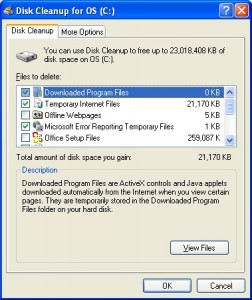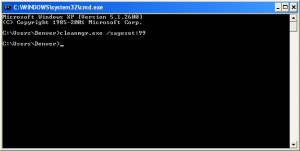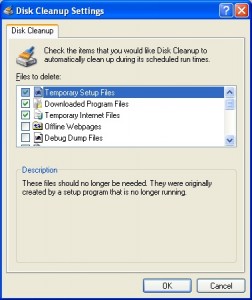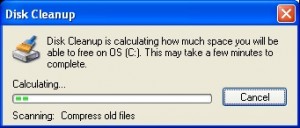| | Tech Tips - Business IT Support Tips
Posts Tagged ‘cleanup’
Wednesday, February 15th, 2012
There have been countless articles written to help you with reducing temporary files that clutter your hard drive. Windows performs cleanup for most of these files under normal circumstances, but control over the process is limited. To gain more control over these files, you can use CleanMgr as part of a normal monthly maintenance cycle.
In a modern Windows OS, when you click Start/Accessories/System Tools/Disk Cleanup you will note a dialog which will eventually present you with choices of files to remove from your computer. These are left over files from various activities and will look something like this:
 Disk Cleanup can assist you in removing no longer needed files Now you are able to select the categories you want to remove, for example, Temporary Internet Files, Microsoft Error Reporting Temporary Files, Recycle Bin, Temporary Files, WebClient/Publisher Temporary Files, etc. Note these are all temporary files. There are also other categories you should normally never select. These include Office Setup Files, Log Files, Compress Old Files and Catalog files for the Content Indexer. Please note Windows Vista and Windows 7 users will have more options available.
If this is the first time you have ran CleanMgr (Disk Cleanup), the initial scan process could take quite some time. These scan’s may take in excess of an hour. Microsoft had provided a way to streamline this process through preferences, but you have to use the Command Prompt to take advantage of it.
To get started we’ll need to use the CMD prompt. Alternatly, you can “Run” a command from the “Start Button” this will work too.
Let’s start with the CMD prompt:
For Windows XP click Start/Run/CMD
For Windows 7 click Start/All Programs/Accessories/Command Prompt
This will open a Command Console allowing you to type in the following command:
cleanmgr.exe /sageset:99

Running CleanMgr from the Command Prompt
This will bring up a new Disk Cleanup Settings window

On Windows XP computers, you should usually select the following categories: Temporary Setup Files, Downloaded Program FIles, Temporary Internet Files, Microsoft Error Reporting Temporary Files, Old Chkdsk files, Recycle Bin, Temporary Remote Desktop files, Temporary Files, WebClient/Publisher Temporary Files, Catalog files for the Content Indexer. Optionally you could select Debug Dump Files and Offline Webpages as well. You should almost NEVER select Office Setup Files.
On Windows 7 computers, you should usually select the following categories: Temporary Setup Files, Downloaded Program Files, Temporary Internet Files, Debug Dump Files, Old Chkdsk files, Recycle Bin, Service Pack Backup Files, System error memory dump files, System error minidump files, Temporary Files, Temporary Windows installation files, Thumbnails, Files discarded by Windows upgrade, Per user archived Windows Error Reporting Files, System archived Windows Error Reporting Files
Once you have made your selections, Click OK.
Now that you have saved your settings, run the following command:
cleanmgr.exe /sagerun:99
 - The Sagerun Switch
This process could take some time to complete and will run on all attached drives. So if you have network drives or external drives you do not want included, be sure to disconnect or remove these drives.
For more information about using CleanMgr from the command line please reference:
http://support.microsoft.com/default.aspx?scid=kb;en-us;Q315246 (for Windows XP)
http://windows.microsoft.com/en-us/windows7/Delete-files-using-Disk-Cleanup (For Windows 7)
my PC Techs provides expert computer repair and computer consulting services to the Phoenix metro area. For more information or to schedule an appointment please call (602) 456-0150.
Tags: cleanmgr, cleanup, computers, disk cleanup, files, hard drives, temporary files, windows
Posted in Tech Club General | No Comments »
Monday, September 13th, 2010
The modern office is definitely an amazing thing to watch. Emailing, scanning, printing, digital document processing, online database systems, more. What isn’t done via computer in today’s office? As a business owner or manager in charge of running an office, it’s important to remember that productivity in a digital office is often directly tied to the computers that power the office. Office productivity can be boosted significantly with simple technology upgrades. When is the last time the computer systems in your office were upgraded? What about the network? ISP? Accessories, such as printers, scanners, copiers? How about recently added mobile computing technologies (laptops, smartphones)?
 It is important for your office to stay up to date with the latest technologies. When humans using computers power the majority of the operations in your office, it makes sense that faster computers will allow for faster work and increased productivity. Computers that have become old and slow due to age act as a handicap to your employees, and will hold them back from performing at higher levels. In addition, the speed factor is not the only negative that comes from using old technology. Older computers, networks and accessories are more prone to fail, causing office staff to take time away from work to focus on bugs, viruses, errors, and repairs. It is important for your office to stay up to date with the latest technologies. When humans using computers power the majority of the operations in your office, it makes sense that faster computers will allow for faster work and increased productivity. Computers that have become old and slow due to age act as a handicap to your employees, and will hold them back from performing at higher levels. In addition, the speed factor is not the only negative that comes from using old technology. Older computers, networks and accessories are more prone to fail, causing office staff to take time away from work to focus on bugs, viruses, errors, and repairs.
Every office should maintain a reasonable technology budget that allocates a reasonable amount of money to spend, every year, on technology upgrades. When planning this budget, you should go beyond simply looking to replace computers that break. You should be looking to make upgrades that will increase office productivity. Simple things like replacing still working old computers with faster units, installing faster printers, giving employees access to email while in the field via laptops or smartphones. In addition to upgrades, your budget should include regular maintenance. A technician should visit on a regular basis, as often as once per week. Your technician should keep your computers updated, solve minor errors, and perform cleanup tasks to increase performance. That will limit the amount of time office staff must spend fiddling with computers and will allow them to focus on their work.
Ultimately, faster computers in your office will allow your office to perform more efficiently. You will process more work and, as a result, your business will have the capacity to grow further and faster than ever before.
Tags: accessories, Arizona, backups, budget, bugs, business, cleanup, components, computer, computer systems, computers, copiers, data, database, document, drives, email, emailing, employees, errors, fail, faster, handicap, humans, increase, ISP, laptops, maintain, maintenance, manager, mobile, money, networks, office, old, older, operating system, operations, owner, PC, phoenix, power, printers, printing, productivity, repairs, replace, running, scanners, scanning, slow, smartphones, speed, spend, staff, system logs, systems, technician, technology, units, upgrades, viruses
Posted in Tech Club General | No Comments »
WE WORK HARD FOR YOU, BUT DON'T JUST TAKE OUR WORD FOR IT!
We've helped over 1,000 satisfied businesses throughout the Phoenix valley, click here to view some of their testimonials:

©2010 my PC Techs is owned and operated by Leo Polus, L.L.C., concept by Andre Morris |
| |





 It is important for your office to stay up to date with the latest technologies. When humans using computers power the majority of the operations in your office, it makes sense that faster computers will allow for faster work and increased productivity. Computers that have become old and slow due to age act as a handicap to your employees, and will hold them back from performing at higher levels. In addition, the speed factor is not the only negative that comes from using old technology. Older computers, networks and accessories are more prone to fail, causing office staff to take time away from work to focus on bugs, viruses, errors, and repairs.
It is important for your office to stay up to date with the latest technologies. When humans using computers power the majority of the operations in your office, it makes sense that faster computers will allow for faster work and increased productivity. Computers that have become old and slow due to age act as a handicap to your employees, and will hold them back from performing at higher levels. In addition, the speed factor is not the only negative that comes from using old technology. Older computers, networks and accessories are more prone to fail, causing office staff to take time away from work to focus on bugs, viruses, errors, and repairs.





